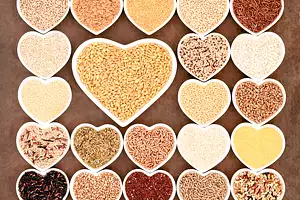Eating a mango is like taking a mini-vacation to an exotic location. The slightly sweet, tropical flavor and delicate aroma of mangos make them feel like an indulgent treat. Mangos are versatile, great for your health, and you don’t need to update your passport or book a flight to enjoy them!
Eat A Mango Today
One cup of mangos contains only 100 calories. Mangos are fat free, cholesterol free, sodium free, and packed with vital nutrients! One serving of mango contains:
- 100% of the Vitamin C you need each day. You might know that Vitamin C supports your immune system and helps wounds heal faster. It also supports brain and nerve function, boosts iron absorption, and makes your teeth and gums healthy.
- Fiber to fill you up. The insoluble fiber in mangos helps your digestive system function properly and can relieve constipation. Their soluble fiber can also help your body regulate blood-sugar levels by forcing your body to absorb sugar into the bloodstream at a slower rate.
- Vitamin A and copper for bone health and a strong immune system. Vitamin A is also necessary for healthy skin and good vision.
- Vitamin B6 to regulate blood sugar levels, support nerve and immune system function, and provide oxygen to your tissues.
- Plenty of antioxidants to reduce inflammation throughout your body and decrease your risk of developing diseases, such as Alzheimer’s, cancer, diabetes, and heart disease.
Finding the Right Mango and Making It Last
Whether a mango is ripe or not has nothing to do with its color. A ripe mango should give slightly under gentle pressure, like a peach or avocado. Don’t judge a mango by its smell - an unpeeled, fully ripened mango will not necessarily have an aroma.
Like most stone fruits, mangos can be ripened at room temperature in a paper bag. They should not be refrigerated until they are completely ripe. Only then can they be kept in the fridge for up to five days. Once mangos have been prepared, they can be stored in an airtight container in the refrigerator for one week or frozen for up to one year.
Mangos can be added to the blender for smoothies straight from the freezer. If you use mangos in sauces quite often, consider pureeing your mango in a blender and then freezing the puree in ice cube trays.
Approaching a Mango the Right Way
Enjoying the juicy and delicious fruit of your mango could be tricky. Inside of the mango is a large, flat seed. You want to slice down the mango lengthwise, as close as possible on each side of the seed. Now you should have three segments: two side pieces and the seed with a ring of fruit around it. Slice the fruit off the seed and use your knife to remove the peel.
Now it is time to prepare the remaining fruit, porcupine-style. Cut a hash pattern into the fruit as close as possible to the skin, without going through. Then, use your thumbs to push up from the skin side, giving your piece of mango a porcupine-like appearance, use your fingers or a knife to pop off the cubes of fruit you created. Discard the seed and peel and enjoy your mango. Be careful when you work with mangos, as mango juice will stain your clothes.
Now that you know how to handle a mango, try some of these delicious sweet and savoury recipes:
Main Dish :
Indian Spiced Eggplant Lentil Salad with Fresh Mango
Grilled Chicken Breast with Mango Salsa
Coconut Chicken with Tropical Mango Rum Sauce
Balmain Bugs with Mango Sauce (Lobster)
Easy Turkey Burgers with Mango Chutney
Grilled Tuna Burger with Spicy Mango Ketchup
Spiced Vegetable Pakoras with Mango Relish
Skewered Shrimp on Sugar Cane with Mango Lime Salsa
Salad :
Roasted Corn, Black Bean and Mango Salad
Chilled Couscous Salad with Mango
Mango, Jalapeno and Basil Quinoa Salad
Snow Pea and Mango Salad with Hazelnuts
Curried Chicken and Mango Salad
Baby Greens and Fresh Mango Salad with Spicy Ginger Raisin Vinaigrette
Dessert :
Dark Chocolate Chunks and Dried Mango Cookies
Mango-Coconut Pie with Mango Coulis
Sides :
Cafe Kati’s Mango Spring Rolls
Drinks :










Comments